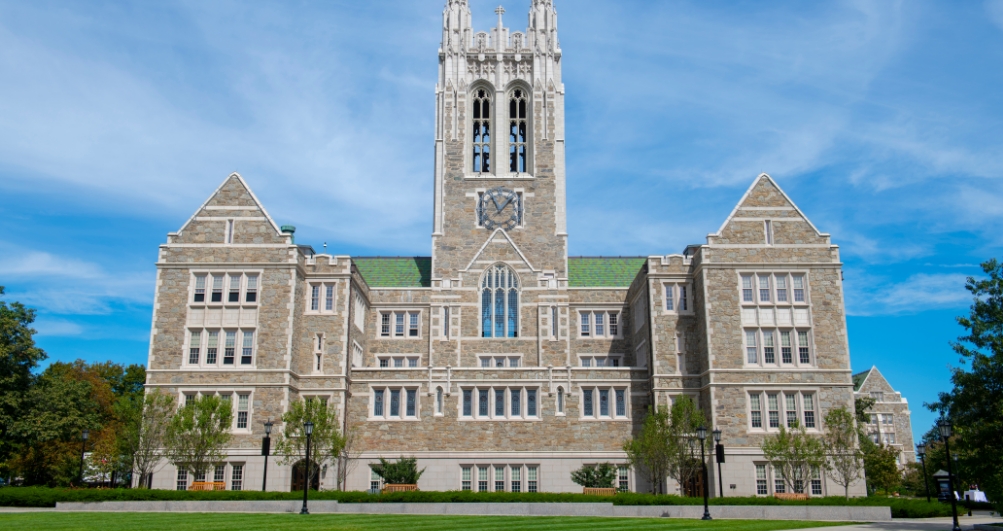Sure, college is about getting an education, but it's so much more than that. While you want to attend a great school, you also want to enjoy your time outside the classroom. This means location matters.
Our suggestion? California! The Golden State has a quality higher education system. Oh, and it's blessed with a coastal location, gorgeous natural scenery, and fun sights, from buzzy Los Angeles (Hello, Hollywood!) to serene Napa Valley.
California has a big selection of private and public university options, offering plenty of opportunities for in-state and out-of-state students. Read on for a roundup of some of the top colleges in California in 2024, in no particular order.
10 best colleges in California
California has more colleges and universities than any other state in the country. Understandably, it can be overwhelming to pick just one (but resources can help). Here are 10 of the best.
Stanford University
Acceptance rate: 4%
Six-year graduation rate: 96%
Stanford is a private school with roots dating back to 1885. If you're looking for something smaller than the huge University of California system, Stanford is a great pick: undergraduate enrollment is just 7,645 students. Average tuition and fees come to about $56,169 per year.
Stanford's suburban setting is ideally located in the California Bay Area. If you're hankering for some metropolitan action, San Francisco is about 37 miles away.
Fun fact: Stanford has produced many business leaders and is known as the "billionaire factory." If you want to earn big bucks in Silicon Valley, start here.
University of California, Berkeley
Acceptance rate: 14%
Six-year graduation rate: 93%
Another in the UC system, UC Berkeley is a behemoth compared to Stanford, with an undergrad enrollment of about 31,814. That said, a big student body means plenty of activities, including a thriving fraternity and sorority system.
The campus is located in the city of Berkeley. It's got plenty of famous alumni and faculty, from Nobel Prize winners to MacArthur Fellows and Pulitzer Prize awardees. As for tuition, in-state students pay about $14,226 and out-of-state students pay about $43,980.
University of California, Los Angeles
Acceptance rate: 11%
Six-year graduation rate: 92%
If Hollywood is calling, UCLA is the place to go. The school is located in LA's Westwood community, a mere five miles from the Pacific Ocean. Sounds like a dream to us!
If surf and sand isn't your thing, rest easy: UCLA has more than 1,000 student organizations and 65 Greek chapters. The school has an undergraduate enrollment of about 32,122. Tuition and fees come to approximately $13,258 for in-state and $43,012 for out-of-state students.
California Institute of Technology
Acceptance rate: 4%
Six-year graduation rate: 93%
Caltech is the place to go if you're interested in a quality STEM education. That said, it isn't cheap. Expect tuition and fees to come to about $58,680. In exchange, you'll get a focused, personalized education and small class sizes. The total undergrad enrollment is about 987 students.
The campus is located in Pasadena, about 11 miles north of Los Angeles. Another plus: First-year students receive guaranteed housing, and many students live on campus all four years.
University of Southern California
Acceptance rate: 13%
Six-year graduation rate: 92%
USC is another private institution with a hefty price tag. Annual tuition and fees come to about $61,503. The school is located in LA but has satellite sites in Sacramento and Washington, D.C. Students have plenty of classmates to mingle with - the undergraduate student body numbers about 20,790 people.
This is the place to be for anyone dreaming of breaking into Hollywood. The USC School of the Cinematic Arts has a strong reputation (famous directors George Lucas and Judd Apatow studied here, among others).
Pomona College
Acceptance rate: 7%
Six-year graduation rate: 93%
Pomona College is part of the Claremont Colleges consortium, which includes Claremont-McKenna College, Pitzer College, and Harvey Mudd College. That means Pomona students can take courses at any of those other schools, too.
This is great news, given how small Pomona is. With 1,764 undergrads, it's a cozy community. The average cost of tuition and fees is about $56,686. The school is located in Claremont, approximately 35 miles east of downtown LA.
University of California, Irvine
Acceptance rate: 29%
Six-year graduation rate: 84%
UC Irvine has an undergrad enrollment of about 29,449. It's a great option for in-state students, costing about $13,775. Out-of-state students can expect to pay significantly more: $43,529. You'll get a quality education for your money, though, as UCI is a respected research institution.
The school is located in Orange County and is well-known for its work in areas like neuroscience and cancer research. It's also known for its eco-friendly initiatives. Oh, and best of all: Huntington Beach and Long Beach are just miles from campus.
University of California, San Diego
Acceptance rate: 34%
Six-year graduation rate: 89%
If sports are a priority for you, take a look at UCSD. Located in the vibrant San Diego community of La Jolla, UCSD competes in more than 20 NCAA Division II sports. What'll it cost you? Tuition and fees add up to about $14,700 for in-state students and $44,454 for out-of-state students.
Here's another pro: Freshmen are guaranteed on-campus housing for two years (but it's not mandatory). The undergrad student body is large, with around 33,343 students.
University of California, Santa Barbara
Acceptance rate: 29%
Six-year graduation rate: 85%
UCSB is set in a gorgeous, scenic location about 100 miles north of Los Angeles. The campus literally overlooks the Pacific Ocean. There are plenty of activities to explore, including varsity and non-varsity sports, NCAA division teams, and a thriving Greek scene.
UCSB's campus is home to some 23,091 undergraduate students. As with other California state schools, expect a big difference between in-state versus out-of-state tuition. In-state tuition costs about $14,406, while out-of-state tuition costs about $44,171.
Pepperdine University
Acceptance rate: 53%
Six-year graduation rate: 83%
Located in picturesque Malibu, Pepperdine University is a unique option because it's the only Christian college on our list. The school takes religion seriously: Students must attend a minimum number of spiritual events every semester and take required religion courses.
Pepperdine costs about $60,000 per year and has facilities abroad in countries like Switzerland, Argentina, Germany, and Italy - perfect for globetrotters. Undergraduate enrollment is about 3,700 students.
What is the best college in California?
Which college out of all the above is No. 1? California is home to three big names widely considered some of the best in the entire country to offer world-class education: Stanford, UCLA, and UC Berkeley are the heavyweights when it comes to academic reputation. The California State University system is also well regarded and a CSU institution might just be the choice for you.
That said, you can't rely on academic reputation alone when picking a school. Stats like a university's graduation rate or student-to-faculty ratio only tell you half the story. The truth is that you need to pick the school that matches with your unique needs. That's something you can't figure out from looking at any "best of" rankings.
How to choose the best California college for you
If you're not supposed to rely on academic reputation alone, how are you supposed to figure out which school to attend? The methodology is pretty simple: It's all about your personal needs and wants.
Here are some points to consider:
- Is the program you want available? Start with the basics. Does the school have the bachelor's or master's degree - or even doctoral degree - program you want? While undergrad programs are pretty standardized, graduate programs vary between schools.
- Does the school offer the major and/or minor you want? While you don't have to select your bachelor's degree concentration before starting school, if you have an idea of what you want to study, make sure the school offers it. You might also want to consider the school's reputation in that specific degree field. For example, some schools are known for their arts programs, while others are better known for sciences.
- Are the activities you want available? Maybe you want to join the swim team or be in a fraternity. Or perhaps you're eager to play in the orchestra or join the marching band. Whatever the case, take the time to research the school's extracurriculars and athletics programs to ensure they have what you're interested in. For example, a liberal arts college or research university may not be big on sports.
- Is the campus environment right for you? Location is one factor. Consider whether you want to be in an urban center or a more remote college town. Touring the campus is a great way to get a sense of the atmosphere and what the student body is like. Check out our tips for touring campuses.
- Can you afford it? College in America is pricey. While you can take out loans, you don't want to spend the rest of your life paying them off. Assess costs, considering the difference between in-state and out-of-state tuition as well as private and public schools and institutions. Also, consider grants, scholarships, and other financial aid options.
Use College Rover to find the best school for you
At the end of the day, finding the right school for you requires one thing: doing your research! Did we just give you a homework assignment? Kind of. Don't stress, though - we'll help you with the task.
College Rover can help you research schools, degree programs, acceptance rates, and more, giving you all the info you need to find your dream school. Ready to start comparing schools and narrowing down your list of options? Sign up to get started.
College Rover gets the majority of its data directly from the U.S. Department of Education (DOE). The DOE publishing schedule "lags" the most current data which some colleges post on their official websites. This may cause there to be a difference in the data you see on College Rover and an individual college website. College Rover's website is updated as the DOE data becomes available and is configured for the College Rover website.





.jpg)
.jpg)

.jpg)

.jpg)


.jpg)








